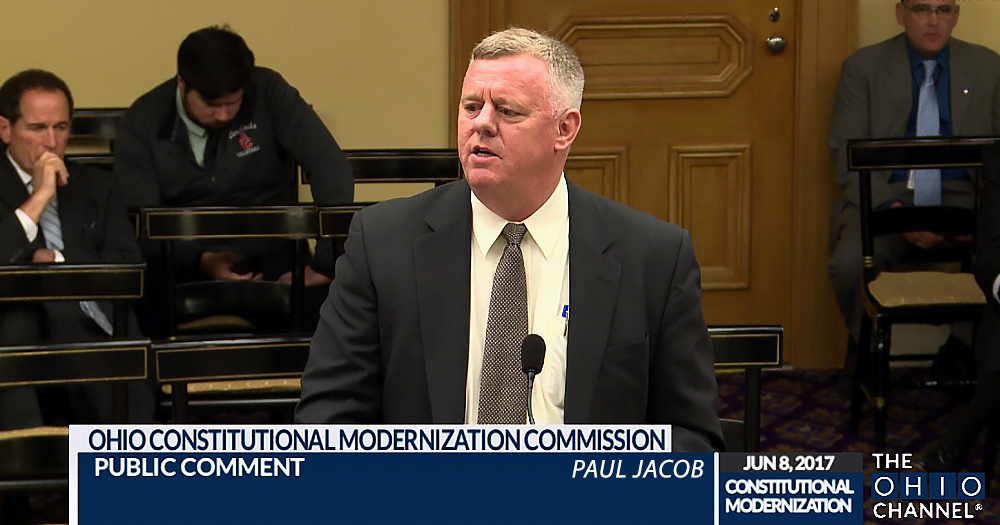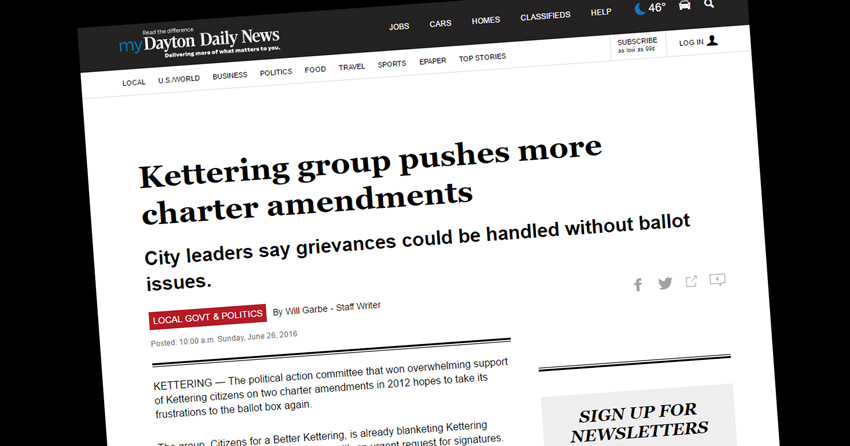(pictured above: mostly peaceful explosion)
Governments and Experts


(pictured above: mostly peaceful explosion)

An “expensive friend” — in documents obtained by federal prosecutors, that’s how former FirstEnergy CEO Chuck Jones sized up former Ohio Speaker of the House Larry Householder.
What made the Speaker so Big Ticket?
“Republican Larry Householder hatched a plan to cement his hold on power for an additional 16 years,” The Columbus Dispatch reported, “and Akron-based FirstEnergy Corp. invested $2 million into the effort.”
Their scheme?
Petition a citizen initiative onto the ballot to slap lifetime term limits on legislators, rather than the current eight-year consecutive limits, as bait to hook pro-limits voters — emphasizing this toughening part, while hiding the fact that the eight-year limits in each chamber would be doubled to a 16-year limit in either.
The initiative would also set a brand-new clock, wiping out all past service so that Householder could command the House, uninterrupted, for 16 more years.
“He told me he’ll retire from [the House],” Jones joked with an associate, “but get a lot done in 16 more years.”
The pandemic stopped Householder’s scam. And then, last July, the FBI dropped the other shoe, arresting him for racketeering. Now awaiting trial, Householder has been pushed out as Speaker and then expelled from the House completely — the first time in over 150 years.
FirstEnergy fired CEO Jones — who, according to The Washington Post, “prosecutors continue to investigate” for his “involvement in a $60 million bribery scheme secretly funded by the company to win a $1 billion legislative bailout.”
Mr. Householder never liked term limits, but his corrupt attempts to thwart them serve as evidence of their importance.
This is Common Sense. I’m Paul Jacob.
—
See all recent commentary
(simplified and organized)

“FirstEnergy Solutions might not want to spend its bailout money just yet,” warns a story in Crain’s Cleveland Business.
At issue? A possible statewide referendum on House Bill 6.
HB6 would, according to the Cleveland Plain Dealer, “gut Ohio’s green-energy mandates and set up customer-funded subsidies to nuclear and coal power plants.” It passed the majority Republican state House “thanks to key support from several House Democrats.”
Passage of HB6 through both houses of the Ohio Legislature and its signature by Governor Mike DeWine would force Ohio ratepayers to fork over roughly $150 million in subsidies to FirstEnergy Solutions for its two nuclear power plants.
Except for one thing — in Ohio, voters possess a powerful political weapon: the referendum.
Already a diverse coalition of opponents to the bill has formed Ohioans Against Corporate Bailouts, filed a referendum and kicked off a petition drive that has “until October 21, 2019, to collect the 265,774 required signatures.”
“HB6 has created some strange bedfellows,” the Plain Dealer notices, including bringing together “environmental groups, the fossil-fuel industry, renewable energy companies, and some small-government activists” in opposition.
“Many of the forces that fueled the Trump presidency, before 2016 — I’m talking the Tea Party and others — could be supportive in undoing this bill,” explains Paul Beck, former chair of Ohio State University’s political science department. “And so could people on the left. You may find an incredible divergent group of people aligned with each other.”
“Liberals hate that it subsidizes dirty coal plants,” reports Crain’s. “Many conservatives hate that it picks winners and losers by subsidizing one industry over another.”
Thankfully, the fate of the giveaway rests in the hands of Ohioans, not their subsidy-loving representatives.
This is Common Sense. I’m Paul Jacob.

—
See all recent commentary
(simplified and organized)

Last week, the Ohio Constitutional Modernization Commission considered whether to recommend a constitutional change to create an obvious double standard: requiring citizen-initiated constitutional amendments to obtain a 55 percent supermajority vote, while the very same amendments proposed by legislators would only need 50-percent-plus-one for passage.
I traveled to the capitol in Columbus, joining a room full of Ohio citizens and organizations testifying in opposition. As I explained at Townhall yesterday, after hearing from the people, the Commission tabled the idea.*
For more than four years, the Constitutional Revision and Updating Committee deliberated over how to improve the constitution and came to a consensus in favor of the aforementioned double standard (sent to the full Commission). And yet, at a well-attended public hearing, no one defended the proposal.
While bias favoring the legislature seemed obvious, commissioners bristled at the suggestion that — established and funded by the legislature — they lacked independence. “If there were one or two legislative members on our committee, that was it,” offered non-legislator Janet Abaray.
Actually, four of the nine members on Abaray’s committee are currently state legislators — not one or two. Plus, two more previously served in the legislature. That’s two-thirds of the committee comprised of current or former legislators.
Moreover, the published minutes provide a peek into the thinking behind the proposed double standard. For instance, “what have emerged lately are initiated amendments to the constitution that are inconsistent with the purpose of the constitution.”
It is the people who will decide what belongs in the people’s constitution — not the legislature.
And not the legislature’s commission.
That’s the truth that Ohioans spoke to power.
And power listened.
This is Common Sense. I’m Paul Jacob.
* The commission came to this conclusion with only one dissenting vote.

Former State Representative Matt Lynch got right to the point in his Cleveland Plain Dealer op-ed: “The people’s right to amend the Ohio Constitution through the ballot initiative is under attack.”
Created by the Ohio Legislature to consider constitutional amendments, the Ohio Constitutional Modernization Commission (OCMC) has a hidden purpose: provide cover for that same legislative body. As Lynch aptly notes, the OCMC “is filled with politicians and lobbyists. Thus, commission recommendations must be scrutinized for fidelity to the public good versus the special interests of political insiders.”
This Thursday at the capitol in Columbus, OCMC will consider whether to recommend that state legislators propose an amendment to the state constitution to make future amendments more difficult. That’s an awfully bad idea in itself. But, bizarrely, the greater difficulty would depend entirely on who proposes the amendment.
The working OCMC recommendation makes no change to the legislature’s ability to propose and pass constitutional amendments. What it would do is make it tougher for citizen-initiated amendments. Most unhelpfully, the recommendation would require only citizen-proposed amendments to garner a supermajority of 55 percent of the vote.
Consequence? Suppose a measure proposed by citizens — term limits, ethics reform, government transparency — was massively outspent by powerful interests, and yet still won 54.9 percent of the vote. It would lose.
Yes, the 45.1 percent of voters would defeat the 54.9 percent of voters.
Call it “New Math.”
The very same issue proposed by legislators would win . . . and be added to the state constitution.
“The double standards are breathtaking,” writes Lynch,* adding, “and no other state has such unfair rules.”
This is Common Sense. I’m Paul Jacob.
* Sunday at Townhall, I also discussed this double standard. And the word may be getting out. Townhall always adorns my column with a photograph — this time featuring Ohio Attorney General Mike DeWine, also a Republican candidate for governor in 2018. DeWine’s campaign objected to being pictured, arguing they have no involvement with the OCMC. DeWine’s picture has been removed.

Maybe President-Elect Donald Trump can whip Washington into shape. We can hope. And help. Especially on congressional term limits.
But remember: local political fiefdoms can oppress as harshly as the Feds. So . . . who is whipping your town into shape?
Well, welcome to Kettering, Ohio.
Just months ago, Kettering’s powers-that-be placed a new charter amendment on the ballot to weaken term limits. And one citizen, Ron Alban, wasn’t amused. He and two other longtime residents formed Citizens for a Better Kettering (CBK), but not merely to fight the attack on term limits. They also petitioned five new reforms onto the city ballot.
I met this busy activist back in January, while he was working to place an ethics reform measure on the Ohio ballot — before being blocked by the state ballot board. In 2012, Ron had organized a petition drive to put a pay cut and council term limits on Kettering’s ballot. Both passed.
Ron’s CBK measures were: to protect citizen input at council meetings; to require greater transparency on city salaries; to hold elections for council vacancies; to strengthen citizens’ ability to enforce charter provisions; and banning the city council from proposing future charter amendments dealing with term limits, council pay and the citizen ballot initiative process.
On Tuesday, the anti-term limits charter amendment failed.
And all five reform amendments passed overwhelmingly.
Alban and CBK aren’t as media savvy as Mr. Trump, or as wealthy. But their incredible success is a bright beacon of hope.
Most cities in this country have a petition process whereby thoughtful, hardworking citizens can change their local world. Most of us can do what Citizens for a Better Kettering just did.
This is Common Sense. I’m Paul Jacob.